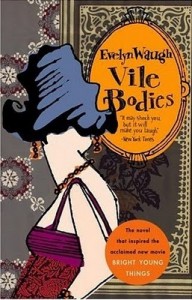 Evelyn Waugh was a British journalist and author known for his biting social satire and his unfortunate personal failings (racist, elitist, fascist sympathizer…the list is long). Nevertheless, he remains one of the great English comic writers and his second novel, Vile Bodies, showcases his talents superbly.
Evelyn Waugh was a British journalist and author known for his biting social satire and his unfortunate personal failings (racist, elitist, fascist sympathizer…the list is long). Nevertheless, he remains one of the great English comic writers and his second novel, Vile Bodies, showcases his talents superbly.
Centering around a cast of “idle rich” characters whose lives consist of little more than drinking and partying, broken up by glances at gossip columns where they can read about their exploits, Vile Bodies mercilessly excoriates a class of men and women who have never worked a day in their lives, whose incomes are inherited, exaggerated or borrowed, and who think of nothing more than their own pleasure and the pursuit of same. Thus Waugh’s caustic narrator describes one hostess: “It was too thrilling to see all that dull money her father had amassed, metamorphosed in this way into so much glitter and noise and so many bored young faces.”
Waugh had his share of romantic troubles and no doubt some ill will leaked into the narrative, as the novel’s comedy belies its frightening cynicism. The quasi-protagonist Adam Fenwick-Symes (other colorful names include Miles Malpractice, Agatha Runcible and Prime Minister Outrage), an aspiring writer whose manuscript is confiscated and destroyed by British customs – they do, thankfully, allow him to keep his dictionary, albeit begrudgingly – spends the majority of the novel desperately trying to cobble together enough money to marry Nina Blount, the daughter of a wealthy and comically demented colonel. Their relationship, though not without affection, lacks anything resembling passion, thus we are treated to one of the funniest sex scenes I have ever read, commencing with this exchange:
“We want dinner,” said Adam, “and a room for the night.”
“Darling, am I going to be seduced?”
“I’m afraid you are. Do you mind terribly?”
“Not as much as all that,” said Nina, and added in Cockney, “Charmed, I’m sure.”
Waugh makes great use of ellipses and snippets of narrative that would be utterly confusing were it not for his ability to grant each character a distinctive tone of voice, and the actual lovemaking is disguised, as probably it needed to be if it was going to be printed, in such an ellipsis, but we get a fair estimate of how it went when Nina later remarks, “All this fuss about sleeping together. For physical pleasure, I’d sooner go to my dentist any day.” Ultimately, Nina proves unpersuaded by Adam’s offer of a life of frugality and labor, preferring instead to improve her prospects by marrying a wealthier man.
The novel’s conclusion is bleak, some have even charged out of place or jarring in tone, but to my mind serves as a fitting culmination of the latent cynicism prevalent in the earlier chapters: Adam finds himself on a war-torn field in Europe (recall that this novel was published prior to WWII), his financial prospects, once the sole hope of his future marital happiness, tossed back in his face, valueless due to inflation, and the woman he wished to marry unhappily having another man’s child (or Adam’s child, to be raised by said other man). Beguiled by the comedy and drunk off the schadenfreude of laughing at the misfortunes of the characters, Waugh’s reader feels the force of his ending like a knife in the back: jarring, yes, but fitting all the same, for hedonism and the selfish pursuit of pleasure do not produce happiness or love.